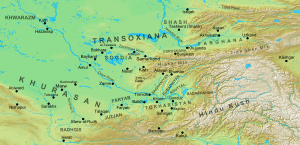| Day of Thirst | |||||||
|---|---|---|---|---|---|---|---|
| Part of the Muslim conquest of Transoxiana | |||||||
 Map of Transoxiana in the 8th century | |||||||
| |||||||
| Belligerents | |||||||
| Umayyad Caliphate | Türgesh Khaganate | ||||||
| Commanders and leaders | |||||||
| Muslim ibn Sa'id al-Kilabi | Suluk | ||||||
| Casualties and losses | |||||||
| Very heavy[1] | Unknown | ||||||
The "Day of Thirst" (Arabic: ﻳﻮﻢ ﺍلعطش, romanized: Yawm al-aṭash) is the name traditionally given in Arabic historiography to a battle fought in 724 between the Turkic Türgesh Khaganate and the Umayyad Caliphate on the banks of the Syr Darya river, in Transoxiana (in modern Tajikistan, Central Asia). The Umayyad army, under Muslim ibn Sa'id al-Kilabi, was campaigning in the Ferghana Valley when it learned of the Türgesh advance. Immediately, the Arabs began a hasty retreat to the Jaxartes, pursued and harassed by the Türgesh cavalry. Finally, after 11 days, the Umayyad army reached the Jaxartes, where it was caught between the Türgesh and the forces of the native Transoxianian principalities. Nevertheless, the Arabs managed to break through and cross the river to Khujand. The Umayyad defeat led to the collapse of Muslim rule over much of the region, which until c. 740 remained disputed territory, with both the Arabs and the Türgesh fighting for control over it.
- ^ Sykes, Percy (10 July 2014). Percy Sykes, A History of Afghanistan. Routledge. ISBN 9781317845867.